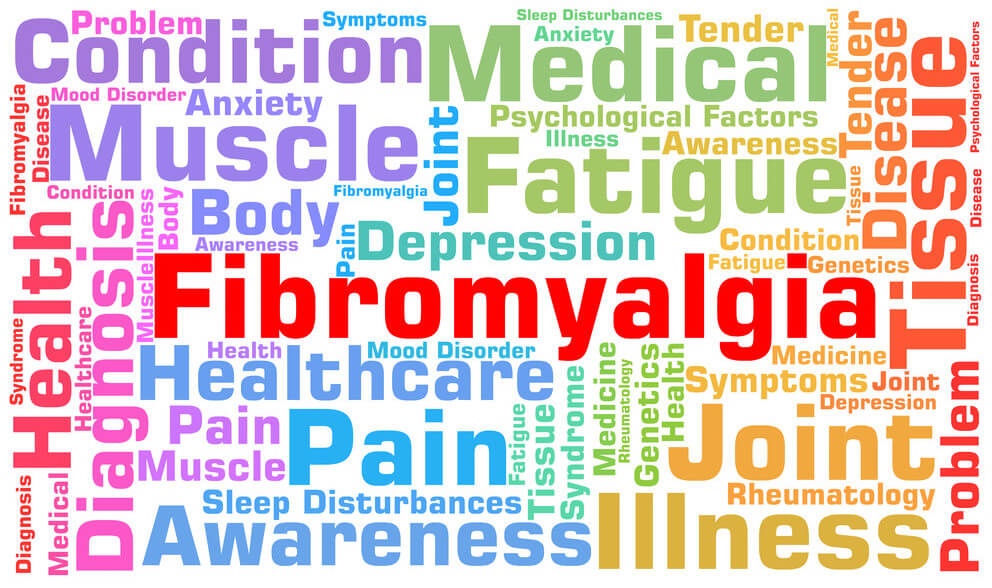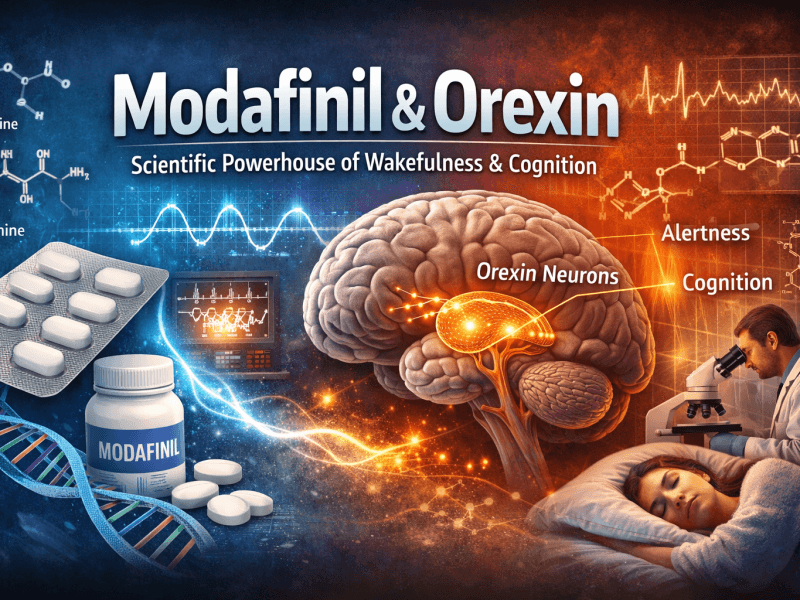Last Updated on 13/02/2026 by James Anderson
The Symptom Gap in Fibromyalgia Management
Fibromyalgia is a chronic, centralized pain disorder affecting an estimated 2-4% of the population. Its core symptom is widespread musculoskeletal pain, but for most patients, the most disabling symptom is not pain it is fatigue.
This distinction is critical. The FDA-approved pharmacotherapies for fibromyalgia: pregabalin (Lyrica), duloxetine (Cymbalta), and milnacipran (Savella) primarily target pain. Their effects on the profound, unrelenting fatigue and cognitive dysfunction (“fibro fog”) that define the patient experience are, at best, modest and inconsistent.
This therapeutic gap has driven interest in off-label agents. Modafinil (Provigil) , a wakefulness-promoting eugeroic, has emerged as a candidate based on a clear neurobiological rationale: if fatigue is a primary driver of disability, then a potent, well-tolerated anti-fatigue agent should offer benefit.
This review provides a rigorous, evidence-based assessment of that hypothesis. We analyze the existing clinical data, dissect the mechanism of action in the context of fibromyalgia pathophysiology, establish clear patient selection criteria, and provide practical clinical guidance for prescribers considering this off-label application. We aim to replace anecdotal enthusiasm with calibrated, evidence-informed clinical judgment.
Fibromyalgia: Redefining the Primary Pathologies
Beyond Pain: The Centrality of Fatigue and Cognitive Dysfunction
Fibromyalgia is classified as a disorder of central sensitization. The brain and spinal cord amplify sensory signals, interpreting non-noxious input as painful. However, the pathophysiology extends far beyond nociception:
| Symptom Domain | Prevalence | Impact on Disability | Response to Standard Therapies |
|---|---|---|---|
| Chronic Widespread Pain | 100% (diagnostic criterion) | High. | Moderate. 30-50% pain reduction in responders. |
| Fatigue | >90% | Very High. Often rated as most disabling symptom. | Low-Moderate. Inconsistent; many patients report no improvement. |
| Cognitive Dysfunction (“Fibro Fog”) | 70-85% | High. Impairs work, driving, social function. | Low. Minimal evidence of robust cognitive benefit from standard therapies. |
| Sleep Disturbance | >90% | High. | Moderate. |
| Mood Disorders (Depression/Anxiety) | 40-60% | Moderate-High. | Moderate. |
Clinical Reality: A patient whose pain is adequately managed but remains bedridden by fatigue has not received adequate treatment. This is the clinical niche Modafinil is proposed to fill.
Pharmacodynamic Rationale: Why Modafinil for Fibromyalgia Fatigue?
The hypothesis is mechanistically sound, though the evidence base remains immature.
Targeting the Hypersomnia/Fatigue Spectrum
Fibromyalgia fatigue is not simple tiredness; it is a state of pathological hypoarousal. Patients describe it as a “lead blanket,” a complete inability to initiate or sustain physical or mental activity. This phenomenology overlaps significantly with the excessive daytime sleepiness (EDS) of narcolepsy and idiopathic hypersomnia conditions for which Modafinil is FDA-approved and highly effective.
Proposed Mechanism in Fibromyalgia:
- Dopamine Transporter (DAT) Inhibition: Modafinil modestly elevates extracellular dopamine in the striatum and prefrontal cortex. This is hypothesized to counteract the hypodopaminergic state implicated in fibromyalgia-related apathy and motivational deficit.
- Orexin/Hypocretin Activation: Modafinil stimulates orexin neurons in the lateral hypothalamus. Orexin deficiency causes narcolepsy; partial deficiency or receptor dysfunction may contribute to fibromyalgia fatigue. Modafinil may compensate for this.
- Histamine Release: By activating orexinergic projections to the tuberomammillary nucleus, Modafinil increases histamine release a potent wakefulness signal.
Critical Distinction: Modafinil is not an analgesic. There is no plausible mechanism by which it directly reduces pain. Any benefit is indirect, mediated through improved function, reduced pain catastrophizing, and increased activity tolerance.
Evidence Review: What the Clinical Trials Actually Show
1. The Landmark Study (Schwartz et al., 2007 — Arthritis & Rheumatism)
This is the only double-blind, placebo-controlled trial specifically examining Modafinil in fibromyalgia.
| Study Parameter | Details |
|---|---|
| Design | 9-week, randomized, double-blind, placebo-controlled. |
| N | 115 patients with fibromyalgia (ACR criteria). |
| Intervention | Modafinil 200-400 mg/day (flexible dose) vs. placebo. |
| Primary Outcome | Fatigue (visual analog scale, VAS). |
| Secondary Outcomes | Pain, sleep, cognition, quality of life. |
Results:
- Fatigue: Modafinil produced a statistically significant reduction in fatigue scores compared to placebo (p = 0.03). The effect size was moderate.
- Cognition: Significant improvement in a measure of cognitive function was also reported.
- Pain: No significant difference between Modafinil and placebo.
- Sleep: No significant worsening of sleep quality (important negative finding; stimulants often disrupt sleep).
Interpretation:
This single positive trial is encouraging but not definitive. It demonstrates that Modafinil can reduce fatigue and cognitive dysfunction in fibromyalgia without exacerbating pain or sleep. However:
- It is a single study.
- The effect size was modest.
- No large, multi-center replication trial has been conducted.
- Long-term (>12 weeks) efficacy and safety data are absent.
2. Subsequent Open-Label and Retrospective Studies
A small number of open-label studies and retrospective chart reviews have reported:
- Response rates: Approximately 40-60% of patients report clinically meaningful fatigue reduction.
- Tolerability: Generally well-tolerated; discontinuation due to side effects (anxiety, headache, insomnia) in ~10-15% of patients.
- Predictors of response: No validated predictors exist, but patients with prominent hypersomnia (sleep >10 hrs/day, unrefreshing sleep, difficulty awakening) may respond better than those with purely physical fatigue.
3. Evidence Summary Table
| Outcome | Evidence Quality | Magnitude of Effect | Clinical Recommendation |
|---|---|---|---|
| Fatigue Reduction | Moderate (single RCT + open-label). | Moderate. | Consider as off-label option in refractory fatigue. |
| Cognitive Improvement | Low-Moderate. | Mild-Moderate. | May consider for patients with prominent fibro fog. |
| Pain Reduction | Low (no benefit in RCT). | None. | Not recommended for pain. |
| Sleep Quality | Moderate (no worsening). | Neutral. | Acceptable; monitor for insomnia. |
| Function/QoL | Low. | Inconsistent. | Insufficient data. |
Clinical Application: Patient Selection and Protocol
1. Appropriate Candidates for a Trial of Modafinil
Modafinil is not a first-line therapy for fibromyalgia. It is an adjunctive, second- or third-line agent reserved for specific clinical scenarios:
Inclusion Criteria (All Must Be Met):
- Confirmed diagnosis of fibromyalgia (ACR 2010/2016 criteria).
- Prominent, disabling fatigue that significantly impairs daily function, despite adequate trials of at least two standard therapies (duloxetine, pregabalin, amitriptyline, cyclobenzaprine).
- Failure of or intolerance to these standard therapies.
- Patient understands the off-label nature of the prescription and provides informed consent.
Exclusion Criteria:
- Untreated or unstable obstructive sleep apnea (OSA). OSA must be ruled out before attributing hypersomnia to fibromyalgia.
- Uncontrolled hypertension or significant cardiac arrhythmia.
- History of psychosis or mania.
- Current pregnancy/breastfeeding.
- Concomitant use of hormonal contraceptives without backup non-hormonal method.
2. Dosing and Titration Protocol
| Phase | Dose | Timing | Duration | Monitoring |
|---|---|---|---|---|
| Initiation | 100 mg (half tablet) | 7:00-8:00 AM | 7 days | Assess tolerance; screen for anxiety, jitteriness, insomnia. |
| Titration | 200 mg | 7:00-8:00 AM | 4-8 weeks | Evaluate fatigue response (patient-reported). |
| Optimization | 200-400 mg* | Divided dose? (AM + noon) | As needed. | Rarely needed; 200 mg is ceiling for most. |
| Discontinuation | Taper if >4 weeks use. | N/A | 5-7 days. | Avoid abrupt cessation (rebound fatigue). |
Note: 400 mg/day is the FDA maximum for narcolepsy. There is no evidence that doses >200 mg/day offer additional benefit in fibromyalgia; they increase side effect risk.
3. Duration of Trial and Response Assessment
- An adequate trial is 4-8 weeks at 200 mg/day.
- Response is defined as:
- Clinically meaningful reduction in fatigue (>30% improvement on a patient-reported fatigue scale, or patient-reported global improvement).
- Improved functional capacity (able to sustain work, social, or domestic activities previously precluded by fatigue).
- Non-response: Discontinue. Do not continue an ineffective medication indefinitely.
Comparative Effectiveness: Modafinil vs. Other Off-Label Fatigue Agents
| Agent | Mechanism | Evidence in Fibromyalgia Fatigue | Advantages | Disadvantages |
|---|---|---|---|---|
| Modafinil | DAT inhibition; orexin activation. | Moderate (1 positive RCT). | Clean alertness; low abuse potential; no pain worsening. | Off-label; potential anxiety/insomnia; contraceptive interaction. |
| Armodafinil | R-enantiomer of modafinil. | Very Low (no specific FM trials). | Longer duration. | Same profile; no advantage over modafinil. |
| Methylphenidate | DAT/NET inhibition. | Low (small studies, mixed results). | Inexpensive. | Higher abuse potential; more cardiovascular side effects. |
| Amphetamine Salts | DAT/NET reversal. | Very Low (case reports only). | Potent. | Not recommended. High abuse potential; anxiety; cardiovascular risk. |
| Bupropion | NDRI antidepressant. | Low (mixed; may help some). | Treats comorbid depression. | Seizure risk; can increase anxiety. |
| L-Methylfolate | Folate analog. | Low (adjunct). | Well-tolerated. | Weak effect; slow onset. |
Clinical Pearl: No agent has robust, high-quality evidence for fibromyalgia fatigue. Modafinil has the strongest single RCT, but this does not constitute definitive superiority.
Safety, Tolerability, and Long-Term Considerations
1. Side Effect Profile in Fibromyalgia Patients
Fibromyalgia patients may be more sensitive to activating medications. Clinicians should anticipate:
- Anxiety/Jitteriness: Occurs in ~10-15%. Often dose-dependent. Mitigate by starting at 50-100 mg and avoiding concurrent caffeine.
- Insomnia: Prevent by strict AM-only dosing. If insomnia occurs despite morning dosing, discontinue.
- Headache: Common but transient. Hydration and dose reduction usually effective.
- Cardiovascular: Monitor blood pressure. Fibromyalgia patients have higher rates of autonomic dysfunction; BP may be labile.
2. The Hormonal Contraceptive Interaction (Mandatory Warning)
Modafinil is a moderate inducer of CYP3A4. It significantly reduces plasma levels of ethinyl estradiol and other steroid components of hormonal contraceptives (pills, patches, rings, implants).
Clinical Mandate: Any female patient of childbearing potential prescribed Modafinil must:
- Be explicitly counseled on this interaction.
- Use a non-hormonal backup method (copper IUD, condoms, diaphragm) during Modafinil therapy and for one full month after discontinuation.
- Have this counseling documented in the medical record.
Conclusion: A Targeted Tool, Not a Panacea
The evidence that Modafinil is an “effective treatment for fibromyalgia” is overstated.
However, the evidence does support a narrower, more precise claim:
Modafinil is a reasonably effective, generally well-tolerated, evidence-based option for managing refractory fatigue and cognitive dysfunction in a subset of patients with fibromyalgia.
This distinction is not semantic; it is clinical. Prescribing Modafinil for “fibromyalgia” invites failure and disappointment. Prescribing it for severe, treatment-resistant fatigue in a patient with fibromyalgia who has failed standard therapies is rational, evidence-informed, and potentially life-changing for the right individual.
The role of the clinician is to identify that individual, set realistic expectations (fatigue reduction, not pain relief or cure), and manage the therapy with the same rigor applied to any other potent CNS-active medication.
FAQ
Is Modafinil FDA-approved for fibromyalgia?
No. This is a strictly off-label use. The FDA has not reviewed or approved Modafinil for this indication. Prescribing is at the clinician’s discretion based on professional judgment and the available evidence.
Will Modafinil help my fibromyalgia pain?
Unlikely. The only placebo-controlled trial found no benefit for pain. Do not expect analgesia. Any pain reduction is indirect (you may be more active and therefore less deconditioned, or less distressed by pain because you are less fatigued).
How quickly will I feel the effect on fatigue?
Modafinil has a rapid onset of action (60-90 minutes). If it is going to help, you should notice a meaningful difference in your energy and wakefulness within the first 3-7 days of reaching an effective dose (typically 200 mg). If there is no benefit after 2 weeks at 200 mg, it is unlikely to work.
Can I take Modafinil with my other fibromyalgia medications?
Usually, yes, but with caution. There are no absolute contraindications with gabapentinoids (pregabalin, gabapentin) or SNRIs (duloxetine, milnacipran). However, combining Modafinil with other activating agents (bupropion) may increase anxiety. Always disclose all medications to your prescribing physician.
‼️ Disclaimer: The information provided in this article about modafinil is intended for informational purposes only and is not a substitute for professional medical consultation or recommendations. The author of the article are not responsible for any errors, omissions, or actions based on the information provided.
References:
- U.S. Food and Drug Administration. PROVIGIL. U.S. Department of Health and Human Services. https://www.accessdata.fda.gov/drugsatfda_docs/label/2015/020717s037s038lbl.pdf . 2015
- Ballon JS, Feifel D. A systematic review of modafinil: potential clinical uses and mechanisms of action. J Clin Psychiatry. 2006
- Willavize, S. A., Nichols, A. I., & Lee, J. Population pharmacokinetic modeling of armodafinil and its major metabolites. https://doi.org/10.1002/jcph.800 . 2016
- Fuxe K, et al. Modafinil enhances the increase of extracellular serotonin levels induced by the antidepressant drugs fluoxetine and imipramine: a dual probe microdialysis study in awake rat. Synapse. 2005
- Mechanisms of modafinil: A review of current research. nih.gov. 2007
- PROVIGIL (modafinil) Tablets. FDA.GOV. 2010
- Oliva Ramirez A, Keenan A, Kalau O, Worthington E, Cohen L, Singh S. Prevalence and burden of multiple sclerosis-related fatigue: a systematic literature review. https://doi.org/10.1186/s12883-021-02396-1 . 2021.
- Ciancio A, Moretti MC, Natale A, Rodolico A, Signorelli MS, Petralia A. Personality Traits and Fatigue in Multiple Sclerosis: A Narrative Review. Journal of Clinical Medicine. 2023
- Mereu, M., Bonci, A., Newman, A. H., & Tanda, G. The neurobiology of modafinil as an enhancer of cognitive performance and a potential treatment for substance use disorders. https://doi.org/10.1007/s00213-013-3232-4 . 2013


